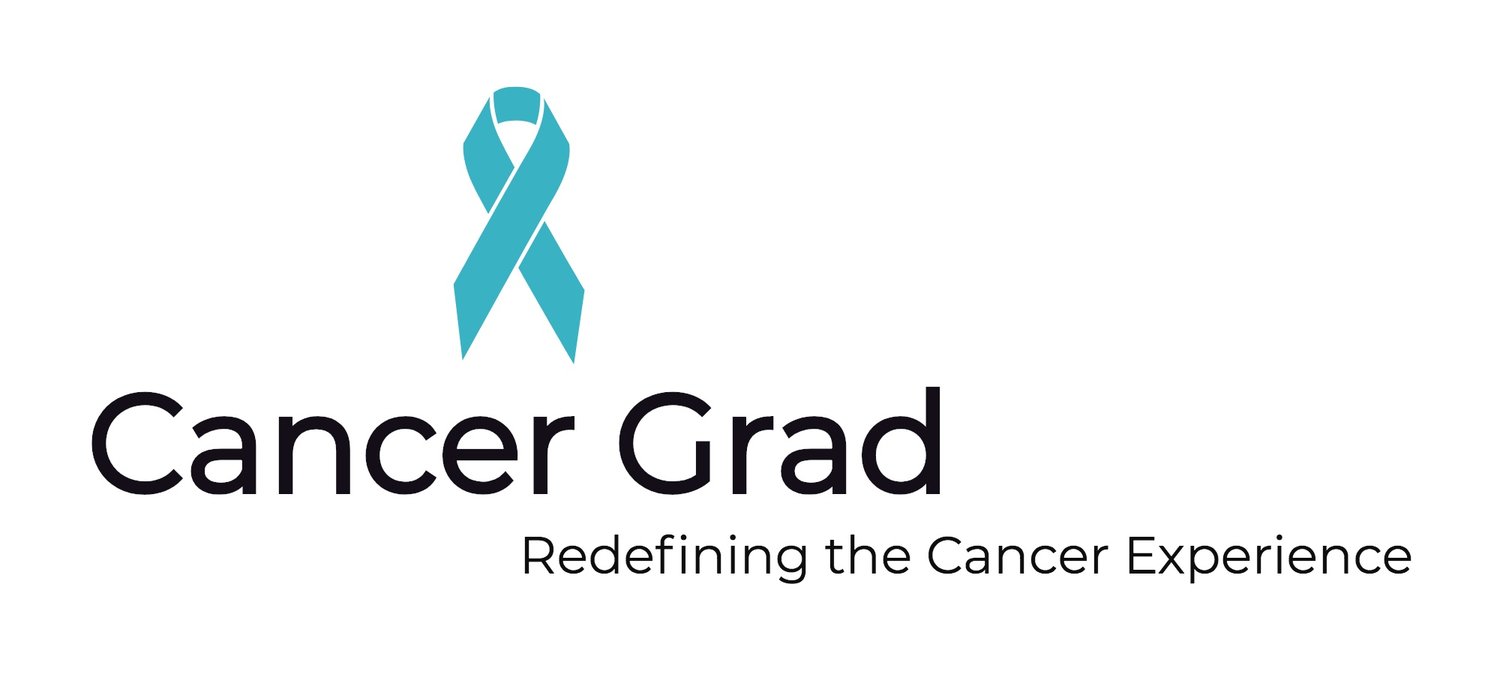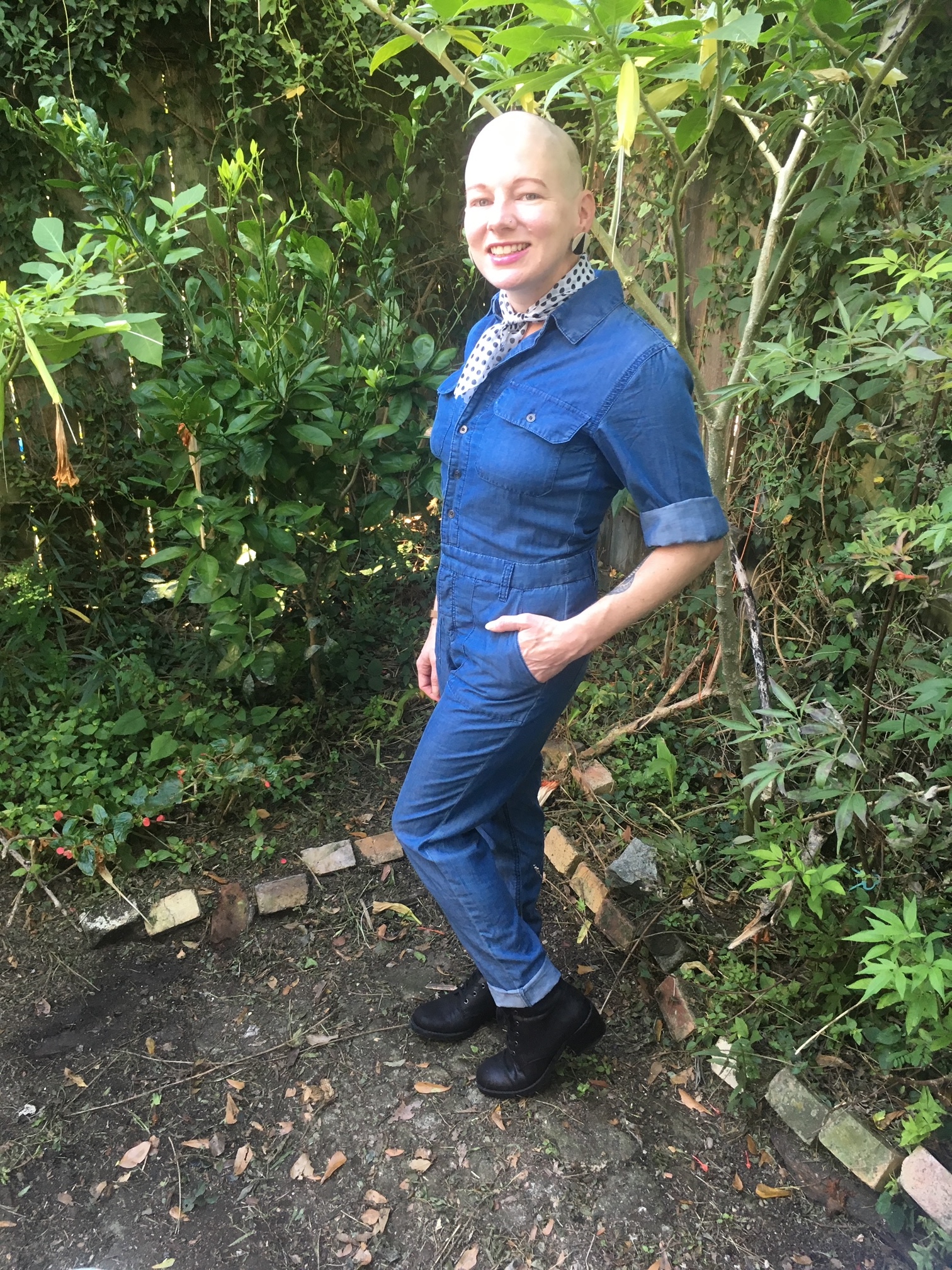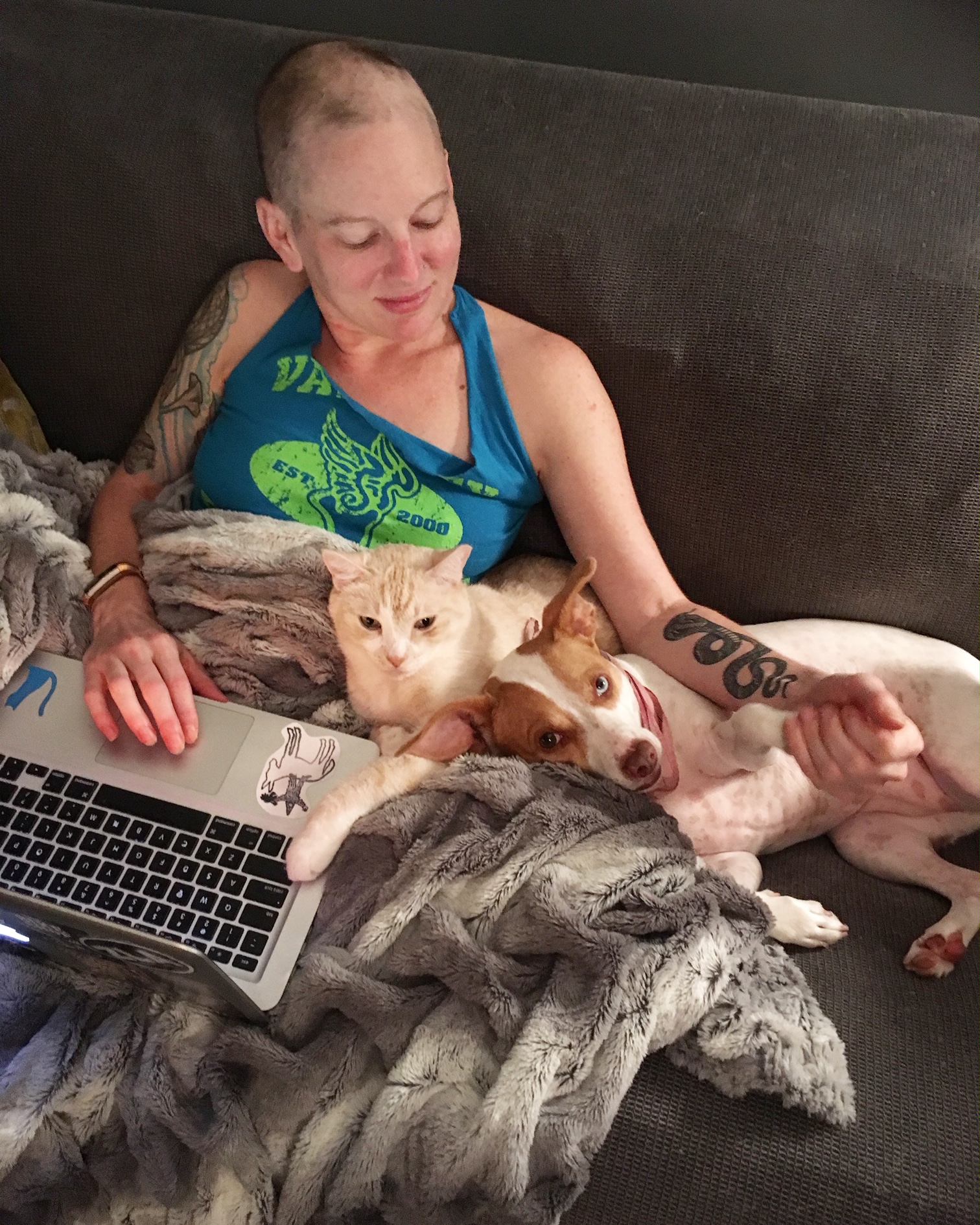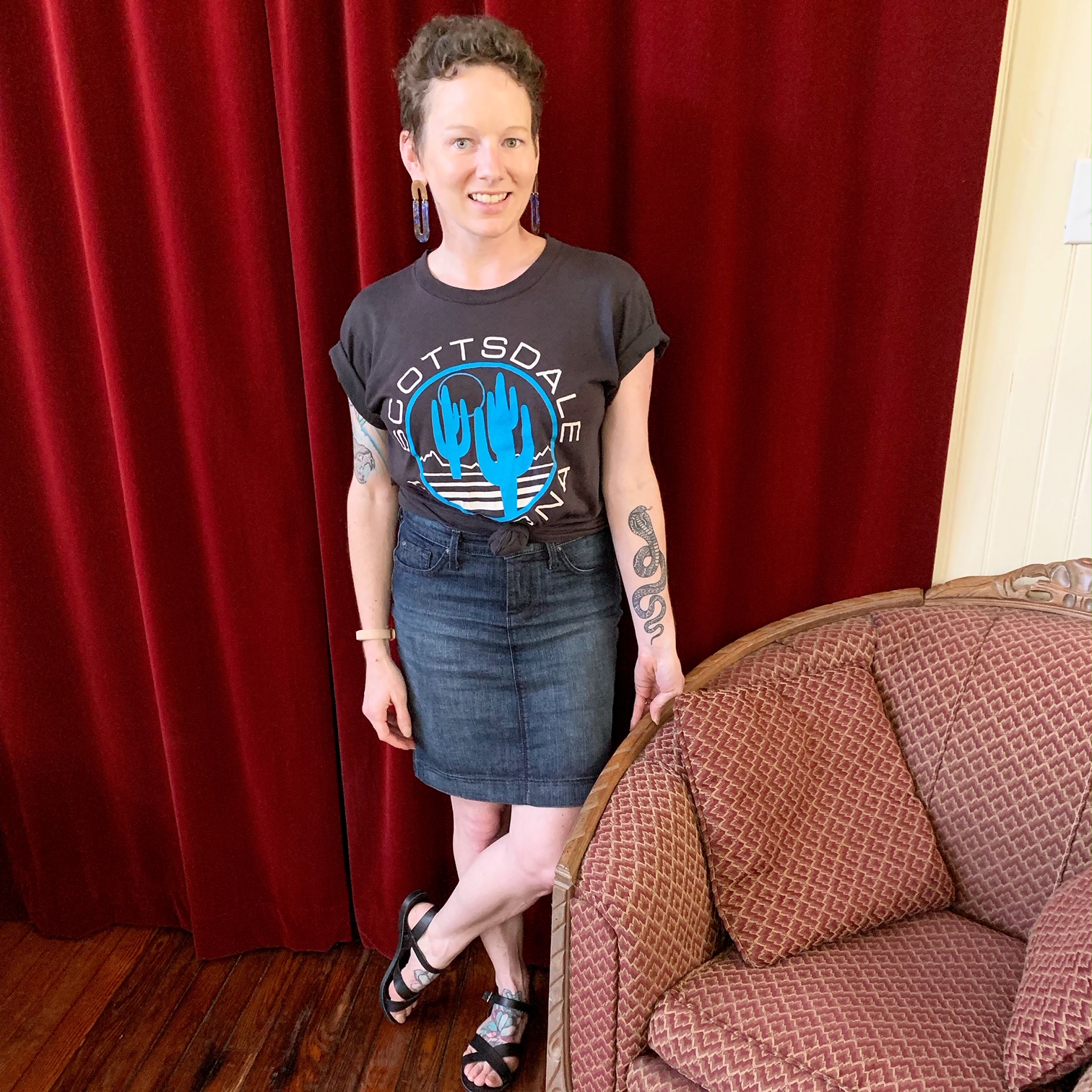Rectal Cancer Grad- Christy
“No matter how much help you have, be it friends and family or an online community, the only person that knows how to best get through this is you. If sitting in front the t.v. ugly crying into a pint of ice cream is what you need to release that energy, then do it. If it’s taking up roller skating, then do it. ”
Name: Christy Lorio
Age at Enrollment: 38
Major: Stage IV rectal cancer with mets to the brain.
What were the primary symptoms you experienced prior to diagnosis?
In hindsight, I had symptoms but I attributed them to dietary changes since I had made the decision to start eating better about a year prior. I had also starting running and attributed a small accident to the “runners shits” but now I realize it was a big warning sign.
What symptom(s) lead you to go to the doctor?
I was in Ireland for work when I had a seizure, which was caused from the brain tumor. I’m working on my Master of Fine Arts in Creative Writing and I am also a graduate assistant for my university’s Ireland study abroad program. I was walking around the city centre alone when I had the seizure. Prior to that I had never had a seizure in my life.
Courses completed:
In this order: Brain surgery to remove the tumor, radiation surgery to my brain post-surgery, a port placement, 12 rounds of chemotherapy, five rounds of radiation, a rectal removal and resectioning with an ileostomy bag, then a surgery to remove the bag nine weeks after surgery.
How did you respond when you heard the words “You have cancer”?
It was my worst nightmare come to life. It was bad enough finding out that I had cancer while I was in a hospital in a foreign country, but those feelings were exacerbated since my dad died from colon cancer 18 years ago. The only reason I found out about the colon cancer was because I told the doctors about my family history, which led to a colonoscopy. Initially the doctors told me they were “99% sure” that the test would come back clear, so when I found out there was a tumor I thought I might die in Ireland and never see my family again.
What has been your hardest moment(s) since your diagnosis? How have you moved forward through them?I’d say the “firsts” were the hardest moments. I eventually learned how to adjust but it was devastating when I first lost my hair, then when I had my first radiation treatment after thinking I wouldn’t need it, then when I woke up from surgery and had to get used to my ileostomy bag.
I’d say initially it was tough trying to navigate life with this new cancer patient identity. It took some adjustment being on campus seeing young, healthy students walking around, seemingly not having a care in the world, when I was slogging to class with a chemo pump hooked up to me. As the semester went on my perspective changed from my cancer being a burden to “hell yea look at everything I am capable of doing.”
What has been your biggest accomplishment since your diagnosis?
Staying enrolled in grad school full-time. I started chemo the week before I entered my second year and somehow managed to miss very few classes. My health insurance is through school so I had to stay enrolled, and my graduate assistantship pays my tuition plus a small stipend, which requires me to keep full-time status. I didn’t want to stop working since that would mean having to take out loans and I was adamant about not incurring any debt for this degree. Some days it felt impossible to keep on top of my coursework and make it to work, especially the weeks I had chemo, but I did it.
What do you believe are the unmet needs of young adult patients within the cancer community?
I didn’t go to any local support groups but I might have if I had known of any specific ones for young adults. Even though I’m not a traditional college student it would have been nice to connect to some students that were also going through cancer.
What advice would you give to someone who is newly diagnosed? What advice would you tell them to ignore? What advice would you give to the caregivers?
Trust your doctors and trust your gut. Do not start Googling symptoms, statistics, etc… Find a support group, be it online or in person, that you feel comfortable with and keep in mind that everyone’s situations are unique to them. And for caregivers, I’d say make sure you are taking care of yourself so you can assist to the best of your abilities. It is so important that neither of you burn out. My husband was there to assist me (as well as other family members) and we functioned as team.
How did your family and friends respond?
They were devastated by the news, especially my mom and siblings since we had been through this before with my dad. It was also surprised by who stepped up to help and support me. I was diagnosed in June and only told a few close friends and family at first and I wasn’t planning on telling anyone else. Then my brother offered to host a fundraiser on my behalf, so I knew that I would need to tell people. I felt uncomfortable putting the information on social media but ultimately I decided to do it and I was glad I did. The outpouring of support was overwhelming in the best way possible. People I had only met on social media offered to cook for me, donated money, offered me rides to treatments, points for free hotel stays, sent me care packages, etc… I didn’t take everyone up on every offer but I was gracious for all of it. Cancer is definitely one of those things that shows you who your true friends are. I had one or two people drop me from their lives and other people that I haven’t spoken to in years reached out to me.
When you feel overwhelmed or anxious, what do you do for relief?
I hit the gym or go for a run. I was very active prior to my diagnosis and I recognize how important physical activity is for my overall well-being.
Describe a situation where you “got back up”:
One day I was sitting in class and we were discussing a book where a character’s father dies. It was too much for me to handle that day so I had to get up and leave the classroom. I went outside and sat on a bench until I had composed myself enough to return to the discussion.
Do you have any new daily/weekly routines since your diagnosis? If so, what are they? How have they improved your quality of life?
I haven’t adopted any new routines but I am trying to get back into ones I had pre-diagnosis, such as going to the gym and running three times a week. I also had to be extra disciplined to juggle coursework and treatments. For example, I knew I would run a fever every Tuesday while on chemo but I also had class on Tuesdays, so I turned my assignments in ahead of time just in case I couldn’t make it to campus. (My professors were more than understanding; I did this more for myself than anything.)
What did you know about the type of cancer that you were diagnosed with prior to your diagnosis?
Very little. I associated it with a death sentence since that was my dad’s outcome. I also assumed that poor diet was a major factor in whether or not you could get cancer. I was so, so wrong.
What do you now want people to be aware of?
There are numerous reasons why someone could get cancer. Sure, we can reduce our risks but sometimes we can’t. I asked my oncologist if there was/is anything I could have done to prevent cancer and she told me, given my family history, that this was “a time bomb” waiting to go off. I’ve seen some health guru types online trying to tout their special diets, supplements, etc… and while some of those things might be useful for some people they aren’t going to completely eliminate the risk, nor are they going to miraculously cure you.
Have you experienced any shifts in your outlook on life due to your diagnosis? If so, what are they?
I bought a t-shirt I found on Instagram that says it all: “It’s time to worry less about dumb shit.”
Have you created any meaning out of this experience?
It’s cliché but it’s true: take nothing for granted. The chemo I was on made it painful to touch or eat cold things. The sensation would dissipate after the chemo wore off but you don’t know how luxurious it is to enjoy a cold drink until you can’t have one.
How did/do you find joy during this experience?
I took extra stock in friendships and made a point to only invest in relationships that were meaningful to me. I also made sure to get out and move when I could. Towards the end of my chemo treatment I took up roller skating for fun and exercise and I splurged and treated myself to fuschia skates with green wheels and skated up to three times a week. Oh! And since I live in New Orleans there are lots of opportunities to wear costumes, especially during Mardi Gras. I made sure to partake in Mardi Gras this year as much as I could despite going through radiation during the height of carnival season.
What has your cancer experience taught you?
You never know what someone is going through/has been through just by looking at them. If I hadn’t lost my hair no one would have suspected that I had cancer.
What do you want your legacy to be?
I haven’t really thought about this! I suppose it would be that I wasn’t afraid to go after what I wanted and that I’m just like my dad—strong, brave, and kind hearted.
If you could write anything you wanted on a billboard in NYC’s Times Square that would reach millions of cancer patients, what would it read?
After my dad died I found great comfort in this quote from Helen Keller. “What we have once enjoyed we can never lose. All that we love deeply becomes a part of us.”
Not a question, but I would add to allow yourself to feel the full gamut of human emotions. There were some days when I felt great and, despite having cancer, like my life couldn’t be better. Then there were other days when I didn’t want get off the couch. Most of my days were somewhere in between. No matter how much help you have, be it friends and family or an online community, the only person that knows how to best get through this is you. If sitting in front the t.v. ugly crying into a pint of ice cream is what you need to release that energy, then do it. If it’s taking up roller skating, then do it.










